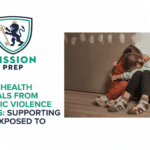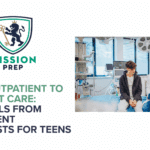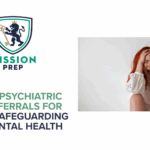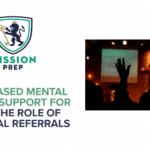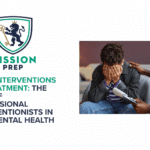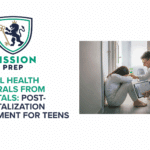Mental Health Referrals From Veterans Affairs Medical Centers: Support for Trauma in Children of Veterans

The ripple effects of military service can extend far beyond veterans themselves. For instance, research shows that children of veterans are more likely to experience emotional and behavioral difficulties when a parent has PTSD after deployment.¹ These challenges often appear as anxiety, mood problems, or difficulties at school.²
Mental health referrals from VA medical centers can connect families with specialized support designed for children and adolescents. Understanding how these referrals work and the types of treatment programs for children of veterans available can help parents feel less alone and better prepared to support their teen.
If you’re concerned about the mental health of your child after a parent’s military service, a mental health professional can guide you on the best course of action for their needs. This page can also help, as it explores the mental health referrals from VA medical centers process by covering:
- Common mental health concerns for children of veterans
- The process of mental health referrals from VA medical centers
- Types of treatment programs for children of veterans
- Coping strategies for secondary trauma in youth
- How Mission Prep can help with family therapy for veteran households

Common Mental Health Concerns for Children of Veterans
Growing up in a household where there are frequent moves and separations can leave lasting marks on a young person. For adolescents, such stress can be amplified when a parent struggles with symptoms of post-traumatic stress.
Adolescent trauma linked to parental PTSD is a well-documented phenomenon that can show up in different ways depending on the teen.³ Some teens might internalize their stress, potentially leading to depression or self-doubt. Additionally, research shows that children who internalize symptoms are at increased risk of poor academic achievement, non-completion of school, and future mental health problems.⁴
Other teens may externalize stress, potentially showing aggression or resistance at school. For example, research shows that children of veteran families are at higher risk of conduct disorder and other behavioral conditions.⁵
Further, the PTSD impact on family and adolescent behavior is not limited to mood or conduct. It can also:
- Disrupt sleep
- Interfere with concentration
- Weaken confidence in relationships⁶
Social challenges can also arise. For example, teens may abandon friendships, feel embarrassed by what’s happening at home, or avoid school activities that might trigger them. Plus, stress in children of veterans doesn’t only affect emotional health. Research also links it to physical complaints such as headaches, stomach pains, and fatigue that do not always have a clear medical explanation.
Such physical and mental symptoms can worsen if left untreated, so it’s important to recognize them early. Without timely support, cycles of worry, anger, and confusion can continue, potentially impacting mental and physical health into adulthood. Therapy for teens exposed to combat stress at home is critical for reducing risks and providing new ways to cope.
What Is the Process of Mental Health Referrals from VA Medical Centers?
Research shows that veterans typically reach a crisis point before seeking help for mental health.⁷ The Department of Veterans Affairs, known as the VA, seeks to change this.
The VA is the primary health system that serves military veterans in the United States. While its focus is on the veteran, the VA also recognizes that mental health challenges can affect the entire family unit. A parent’s trauma can impact children in powerful ways, which is why VA clinicians are trained to look at the wider family system during evaluations.
For families who turn to the VA, the support process usually begins with an assessment of the veteran’s health and a conversation about how the entire household is functioning. If there are signs that a child is struggling, staff may initiate mental health referrals from VA medical centers so that specialized care is provided.
VA referrals for adolescent psychiatric care often involve coordination between VA providers, schools, and local mental health facilities. Families are given information about what kinds of support are available and what level of care fits the situation. For some teens, outpatient sessions may be enough. For others with more complicated needs, inpatient programs for military families’ teens might be recommended.
Communication is central to the process of VA mental health referrals. Families are active participants throughout the referral and planning process; therefore, parents are kept informed about each step so that the referral does not feel confusing or rushed.
Parents and teens are also usually invited into conversations so that treatment goals reflect their needs. This involvement helps reduce stigma and builds trust between providers and families. It also lowers the risk of repeated crises, since care continues beyond the initial referral rather than stopping after a single appointment.
Types of Treatment Programs for Children of Veterans
Specialized programs for adolescents from military households recognize the deep links between service-related trauma and family well-being. The most appropriate treatment for a teen will depend on their unique symptoms and circumstances; however, a number of evidence-based treatments have been adapted for this group, including:
Individual and Group Therapy
Therapy for teens exposed to combat stress at home can occur one-on-one or in a group setting. Individual therapy focuses on developing trust and teaching skills for managing emotions. Group therapy offers the additional benefit of peer support, where teens can learn that they are not the only ones carrying this burden. Moreover, research shows that peer group support can benefit veterans and serving members, as well as their families.⁸
DBT for Teens From Veteran Families
Dialectical behavior therapy (DBT) for teens from veteran families can help adolescents cope with big emotions and work on harmful behaviors. Sessions teach practical strategies for calming intense feelings, tolerating distress, and improving relationships.⁹ It is often used in both outpatient and inpatient programs for military families’ teens because it delivers tools that can be applied immediately.
Residential Care for Teens in Military Families
For adolescents with more severe symptoms, residential care for teens in military families can provide structured, round-the-clock support. These settings combine therapy, education, and daily life skills training in a safe environment. Residential care is often recommended when outpatient services have not been enough or the risks to the teen’s health or safety are high.
Trauma-Focused Therapy
Adolescent trauma linked to parental PTSD often requires specialized trauma-focused treatment. This may include approaches like:
- Trauma-informed CBT¹⁰
- Eye Movement Desensitization and Reprocessing (EMDR)¹¹
- Art therapy¹²
- Horticultural therapy¹³
These treatments can help teens process painful memories and regain a sense of safety. They’re effective because they offer indirect entry points into overwhelming emotions, preventing retraumatization.
For example, a teen who struggles to verbalize painful experiences may be able to express them through drawing, planting, or movement. Such creative and hands-on approaches can reduce defensiveness, helping adolescents feel safe while processing trauma.
They can also build confidence and self-efficacy, reminding teens that recovery involves rediscovering strengths, not just reducing symptoms. When combined with traditional evidence-based talk therapies, these expressive methods can deepen the healing process and provide lasting benefits for mental health.
Family Therapy for Veteran Households
Trauma can affect the entire family. Therefore, family therapy for veteran households may play an important role in treatment. In a family therapy session, both parents and children can discuss stress, communication hiccups, and how military life is impacting them. For instance, parents may be taught how to respond to their child’s needs without adding to stress. Plus, teens may get reassurance that they’re understood and supported.¹⁴ It’s for these reasons that veteran support and family mental health programs are often combined in a comprehensive approach to treatment.
Coping Strategies for Secondary Trauma in Youth
Even with professional treatment, daily coping strategies for secondary trauma in youth can make a consistent difference in recovery. These skills can be practiced at home and reinforced in therapy, and include:
- Emotional regulation for military family teens: This involves recognizing the body’s stress signals and applying calming techniques. Simple breathing practices, grounding exercises, or brief movement breaks can help reduce panic and irritability.
- Reframing negative thought loops: Teens often feel responsible for their parents’ stress. With guidance, they can learn that their role is not to carry the weight of the trauma but to build their own life. Writing exercises, guided journaling, or art projects can help externalize such feelings.
- Increased connection: Coping strategies for secondary trauma in youth often include building supportive peer networks and maintaining contact with mentors, teachers, or coaches. Such stable relationships can help counterbalance the unpredictability that trauma may bring into the home.
- Practical self-care: Adequate sleep, consistent nutrition, and regular exercise are often overlooked, yet play a large role in stabilizing mood. When these habits are paired with therapy and family support, the effects of secondary trauma can be significantly reduced.
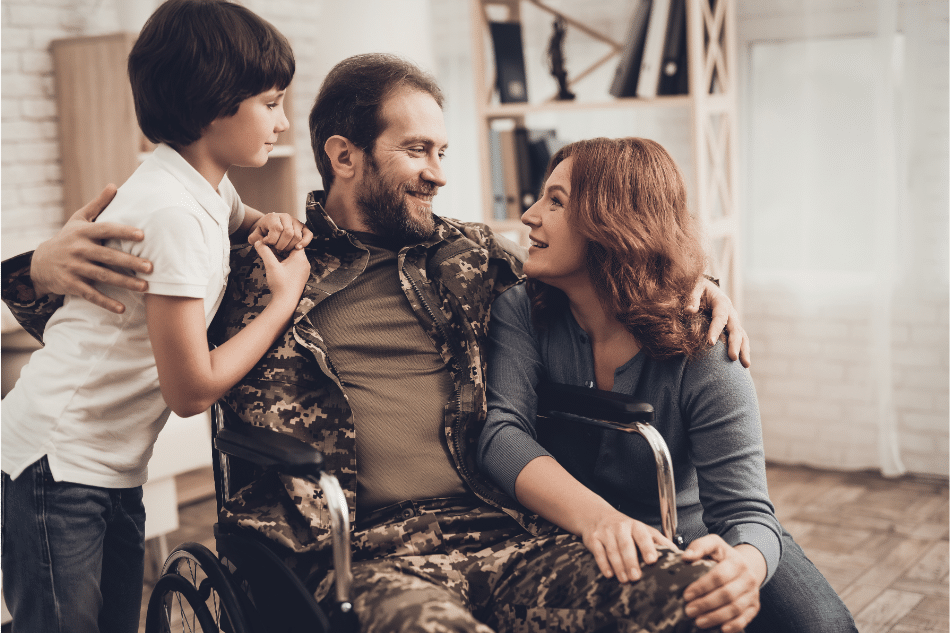
Mission Prep: Support and Family Therapy for Veteran Households
Healing from the impacts of service-related trauma doesn’t have to be a solo journey. VA referrals for adolescent psychiatric care, combined with specialized treatment programs for children of veterans, can create opportunities for growth and resilience.
Mission Prep works alongside families and collaborates with VA partnerships with mental health facilities to deliver care that addresses the unique needs of military households.
By providing therapy for teens exposed to combat stress at home and strengthening the family unit, our team can help children and parents move toward healthier patterns.
If your household has been impacted by trauma, reaching out for support can make all the difference. Contact Mission Prep today to learn more about evidence-based care and family-centered programs. Together, we can support emotional regulation for military family teens and create new paths toward healing.
References
- Selimbasic, Z., Sinanovic, O., Avdibegovic, E., Brkic, M., & Hamidovic, J. (2017). Behavioral problems and emotional difficulties in children and early adolescents of war veterans with post-traumatic stress disorder. Medical Archives, 71(1), 56–61. https://pmc.ncbi.nlm.nih.gov/articles/PMC5364795/
- Klarić, M., Francisković, T., Klarić, B., Kvesić, A., Kastelan, A., Graovac, M., & Lisica, I. D. (2008). Psychological problems in children of war veterans with posttraumatic stress disorder in Bosnia and Herzegovina: Cross-sectional study. Croatian Medical Journal, 49(4), 491–498. https://pmc.ncbi.nlm.nih.gov/articles/PMC2525831/
- Cisler, J. M., & Herringa, R. J. (2021). Posttraumatic stress disorder and the developing adolescent brain. Biological Psychiatry, 89(2), 144–151. https://pmc.ncbi.nlm.nih.gov/articles/PMC7725977/
- Pedersen, M. L., Holen, S., Lydersen, S., Martinsen, K., Neumer, S.-P., Adolfsen, F., & Sund, A. M. (2019). School functioning and internalizing problems in young schoolchildren. BMC Psychology, 7, Article 88. https://bmcpsychology.biomedcentral.com/articles/10.1186/s40359-019-0365-1
- Bommersbach, T. J., Rosenheck, R., & Rhee, T. G. (2022). Transgenerational factors associated with military service: Comparison of children of veterans and nonveterans in a nationally representative sample. Journal of the American Academy of Child and Adolescent Psychiatry, 61(9), 1141–1154. https://www.sciencedirect.com/science/article/abs/pii/S0890856722001782
- Kacmarski, J. A. (2011). Attachment and resilience in military families throughout the deployment cycle (Master’s thesis, James Madison University). JMU Scholarly Commons. https://commons.lib.jmu.edu/cgi/viewcontent.cgi?article=1060&context=edspec201019
- Hitch, C., Toner, P., & Armour, C. (2023). Enablers and barriers to military veterans seeking help for mental health and alcohol difficulties: A systematic review of the quantitative evidence. Journal of Health Services Research & Policy, 28(3), 197–211. https://pmc.ncbi.nlm.nih.gov/articles/PMC10363942/
- Mercier, J.-M., Hosseiny, F., Rodrigues, S., Friio, A., Brémault-Phillips, S., Shields, D. M., & Dupuis, G. (2023). Peer support activities for veterans, serving members, and their families: Results of a scoping review. International Journal of Environmental Research and Public Health, 20(4), 3628. https://pmc.ncbi.nlm.nih.gov/articles/PMC9964749/
- Fleischhaker, C., Böhme, R., Sixt, B., Brück, C., Schneider, C., & Schulz, E. (2011). Dialectical behavioral therapy for adolescents (DBT-A): A clinical trial for patients with suicidal and self-injurious behavior and borderline symptoms with a one-year follow-up. Child and Adolescent Psychiatry and Mental Health, 5, Article 3. https://pmc.ncbi.nlm.nih.gov/articles/PMC3037874/
- Ridings, L. E., Moreland, A. D., & Petty, K. H. (2019). Implementing trauma-focused CBT for children of veterans in the VA: Providing comprehensive services to veterans and their families. Psychological Services, 16(1), 75–84. https://pubmed.ncbi.nlm.nih.gov/30058820/
- Karadag, M., Gokcen, C., & Sarp, A. S. (2020). EMDR therapy in children and adolescents who have post-traumatic stress disorder: A six-week follow-up study. International Journal of Psychiatry in Clinical Practice, 24(1), 77–82. https://pubmed.ncbi.nlm.nih.gov/31663396/
- Haeyen, S., & Wanten, F. (2024). Effectiveness of trauma-focused art therapy (TFAT) for psychological trauma: A mixed method single case study. The Arts in Psychotherapy, 91, Article 102218. https://www.sciencedirect.com/science/article/pii/S0197455624001035
- Siu, A. M. H., Kam, M., & Mok, I. (2020). Horticultural therapy program for people with mental illness: A mixed-method evaluation. International Journal of Environmental Research and Public Health, 17(3), 711. https://pmc.ncbi.nlm.nih.gov/articles/PMC7037774/
- Boyer, W. (2019). Trauma-focused family therapy with children and their families. Family Journal, 27(2), 175–182. https://journals.sagepub.com/doi/10.1177/1066480719832503

